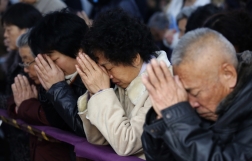
In the past year I have read stories about American evangelical groups failing to love and serve others and I suspect that each story shares a common root cause.
A prominent evangelical college dictated how a celibate LGBT staff member discuss her sexual orientation in public statements.
The leaders in a Texas megachurch attempted to prevent a woman from divorcing her husband in light of serious allegations, and then refused to allow her to revoke her membership.
Ongoing lawsuits surround a denomination's churches in Virginia after senior leaders covered up a paedophile ring among church leaders who assaulted children but may never face charges due to statute of limitations laws.
Despite consistent studies demonstrating that transgender individuals suffer bullying and assault and are at a high risk for suicide, evangelicals continue to dismiss transgender individuals and support unhelpful legislation that singles this group out.
All of these cases are a far cry from preaching the gospel, moving others toward repentance, or doing justly, loving mercy, and walking humbly with our God. Whatever your opinions on LGBT rights, divorce, or the authority structure of the church, followers of Jesus should be able to agree that these news stories are exhibit A in demonstrating that many American Christians have significant issues when it comes to loving others and putting the message of the Gospel first.
Where do American evangelicals lose our core calling to love others and preach the Gospel? How did we lose our way from being the people known for caring for others to being the ones who judge, condemn, and exclude?
It's likely that the starting point for most of our troubles is a single word: control.
When ministry turns into attempts to produce certain behaviors or to restrict certain outcomes, Christians are no longer ministering and serving with the message of Christ. While there's certainly a place for preaching a message of repentance and addressing sins in others, our preaching cannot veer into control and manipulation. Once we begin using legislation or authority structures to block people from make free decisions, we are leaving the domain of the gospel and entering the realm of judgment and control.
Love does not seek to control others. Love is freely given and received back without ultimatums, contracts, or threats. Love is described in 1 Corinthians 13: 4-7 as protecting, selfless, and keeping no record of wrongs.
Thankfully, scripture can guide us toward repentance and transformation so that we can leave our controlling tendencies behind and truly preach the gospel of liberation and freedom that our world needs. Jesus was far more interested in attracting people to the Kingdom than legislating or demanding their compliance:
"You are the light of the world. A town built on a hill cannot be hidden. Neither do people light a lamp and put it under a bowl. Instead they put it on its stand, and it gives light to everyone in the house. In the same way, let your light shine before others, that they may see your good deeds and glorify your Father in heaven" (Matthew 5:14-16).
If Christians are the light of the world, the pursuit of control turns our light into a flame thrower, scorching those who oppose us. Maintaining control over others only puts us in a position to burn them further.
When Jesus speaks of us as the light of the world, there's a sense of Christians being separate and apart from the world's tactics and values, winning them over as we serve and minister. We can't force people into the light.
If we want to identify the areas where American Christians need to change, we can begin by asking: "How does this issue relate to controlling others?"
It's commendable to be zealous for holiness and for the spread of the gospel, but the means can completely undermine the end if we resort to control. Attempting to control others may be the single most effective way to undermine the gospel's message about love and freedom. Manipulation and control under a religious system exchanges bondage under sin for bondage under religion.
As Jesus said: "Very truly I tell you, everyone who sins is a slave to sin. Now a slave has no permanent place in the family, but a son belongs to it forever. So if the Son sets you free, you will be free indeed" (John 8:35-36, NIV).
Ed Cyzewski, MDiv, is the author of A Christian Survival Guide and Pray, Write, Grow. He writes at www.edcyzewski.com and administers The Contemplative Writer: www.thecontemplativewriter.com

















